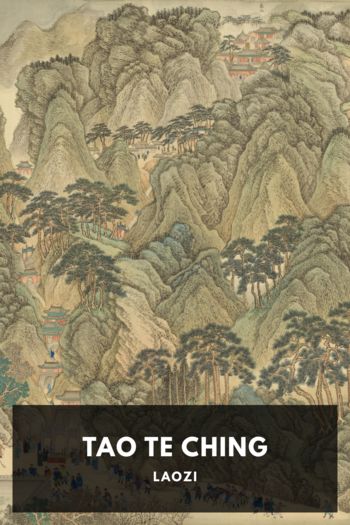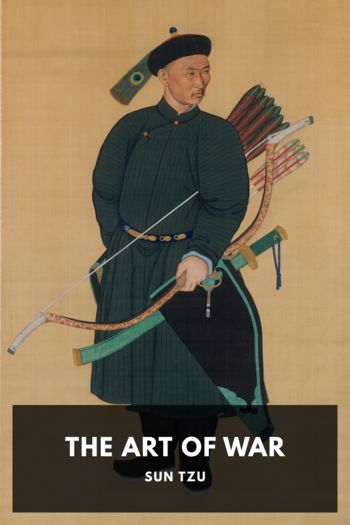Tao Te Ching by Laozi (reading comprehension books txt) 📕

- Author: Laozi
Book online «Tao Te Ching by Laozi (reading comprehension books txt) 📕». Author Laozi
Those principles have to be learned from the treatise of Laozi and the writings of Chuang-tzŭ. We can hardly say that the Taoism taught in them is the Taoism now current in China, or that has been current in it for many centuries; but in an inquiry into the nature and origin of religions these are the authorities that must be consulted for Taoism, and whose evidence must be accepted. The treatise, Actions and the Responses to Them, will show one of the phases of it at a much later period.
The Texts of the Tao Te Ching and Chuang-Tzŭ Shu, as Regards Their Authenticity and Genuineness, and the Arrangement of ThemI will now state briefly, first, the grounds on which I accept the Tao Te Ching as a genuine production of the age to which it has been assigned, and the truth of its authorship by Laozi to whom it has been ascribed. It would not have been necessary a few years ago to write as if these points could be called in question, but in 1886 Mr. Herbert A. Giles, of Her Majesty’s Consular Service in China, and one of the ablest Chinese scholars living, vehemently called them in question in an article in the China Review for the months of March and April. His strictures have been replied to, and I am not going to revive here the controversy which they produced, but only to state a portion of the evidence which satisfies my own mind on the two points just mentioned.
It has been said above that the year BC 604 was, probably, that of Laozi’s birth. The year of his death is not recorded. Ssŭ-ma Chʽien, the first great Chinese historian, who died in about BC 85, commences his “Biographies” with a short account of Laozi. He tells us that the philosopher had been a curator of the Royal Library of Chou, and that, mourning over the decadence of the dynasty, he wished to withdraw from the world, and proceeded to the pass or defile of Hangu,7 leading from China to the west. There he was recognised by the warden of the pass, Yin Hsi (often called Kuan Yin), himself a well-known Taoist, who insisted on his leaving him a writing before he went into seclusion. Laozi then wrote his views on The Tao and its Characteristics, in two parts or sections, containing more than 5,000 characters, gave the manuscript to the warden, and went his way;8 “nor is it known where he died.” This account is strange enough, and we need not wonder that it was by and by embellished with many marvels. It contains, however, the definite statements that Laozi wrote the Tao Te Ching in two parts, and consisting of more than 5,000 characters. And that Chʽien was himself well acquainted with the treatise is apparent from his quotations from it, with, in almost every case, the specification of the author. He thus adduces part of the first chapter, and a large portion of the last chapter but one. His brief reference also to Laozi and his writings are numerous.
But between Laozi and Ssŭ-ma Chʽien there were many Taoist writers whose works remain. I may specify of them Lieh-tzŭ (assuming that his chapters, though not composed in their present form by him, may yet be accepted as fair specimens of his teaching); Chuang-tzŭ (of the fourth century BC. We find him refusing to accept high office from king Wei of Chʽu, BC 339–299); Han Fei, a voluminous author, who died by his own hand in BC 230; and Liu An, a scion of the Imperial House of Han, king of Huai-nan, and better known to us as Huan-nan Tzŭ, who also died by his own hand in BC 122. In the books of all these men we find quotations of many passages that are in our treatise. They are expressly said to be, many of them, quotations from Laozi; Han Fei several times all but shows the book beneath his eyes. To show how numerous the quotations by Han Fei and Liu An are, let it be borne in mind that the Tao Te Ching has come down to us as divided into eighty-one short chapters; and that the whole of it is shorter than the shortest of our Gospels. Of the eighty-one chapters, either the whole or portions of seventy-one are found in those two writers. There are other authors not so decidedly Taoistic, in whom we find quotations from the little book. These quotations are





Comments (0)